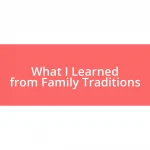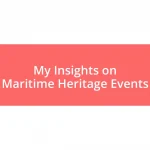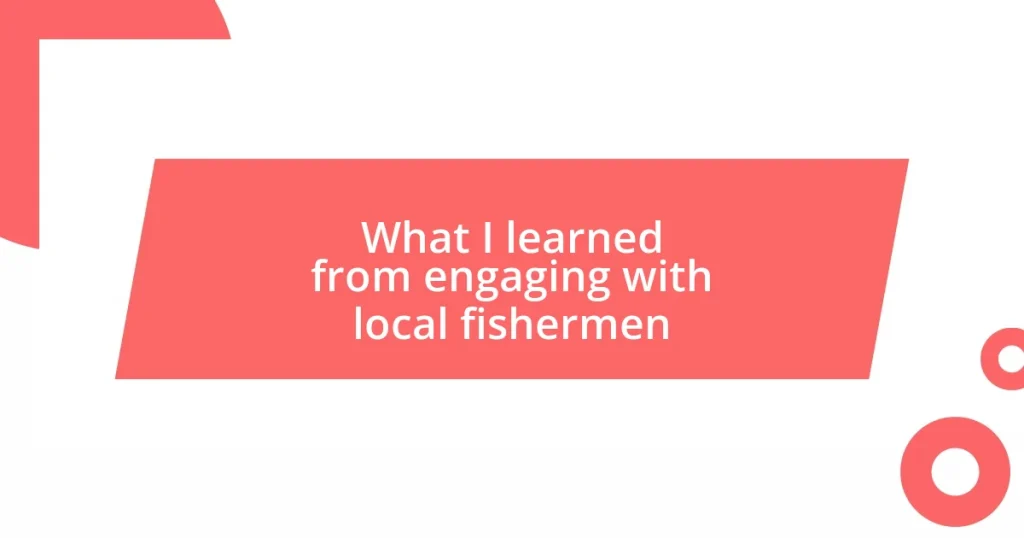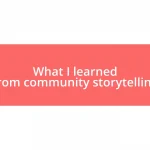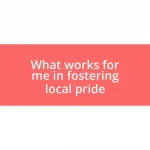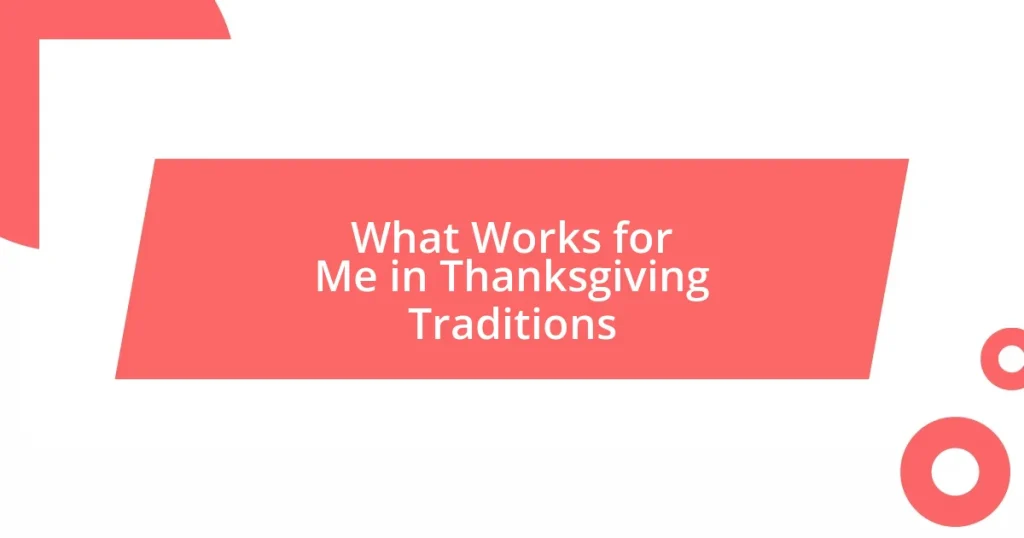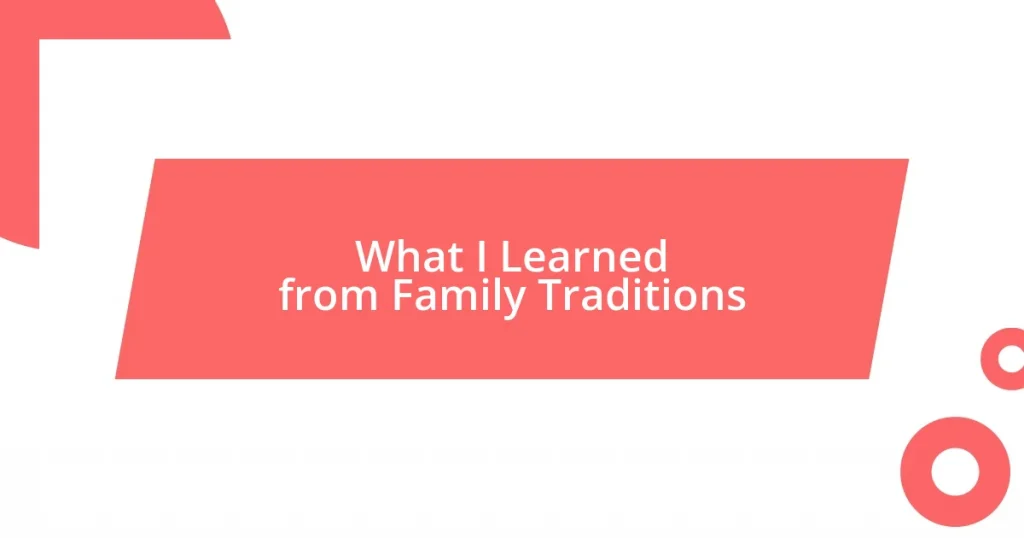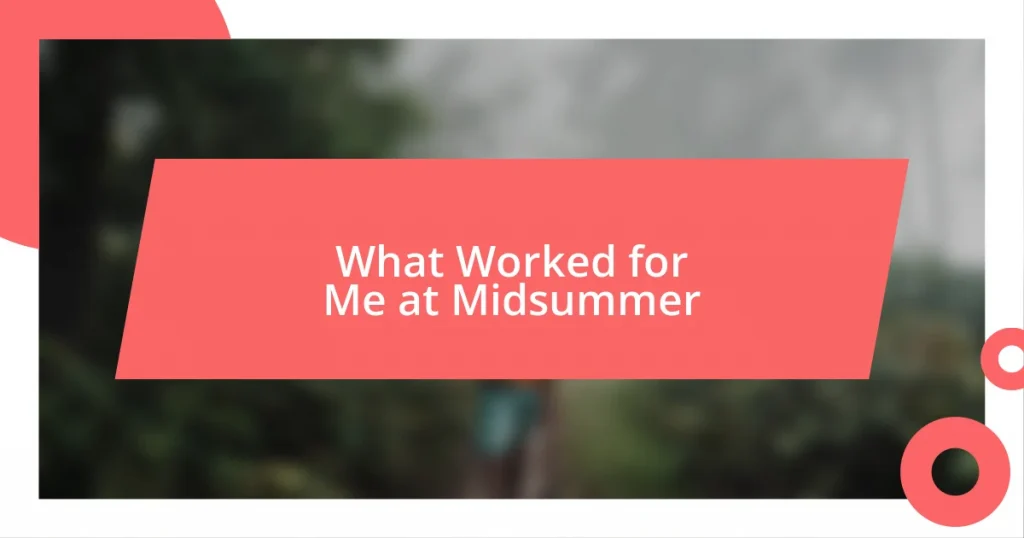Key takeaways:
- Local fishing communities emphasize camaraderie, trust, and collaboration, which are crucial for fostering sustainable practices and sharing knowledge across generations.
- Traditional fishing techniques embody rich histories and sustainable relationships with marine ecosystems, connecting fishermen to their heritage and the environment.
- The impact of fishing extends beyond economy; it fosters community bonds and highlights the importance of listening to fishermen’s experiences when forming regulations for their sustainability.
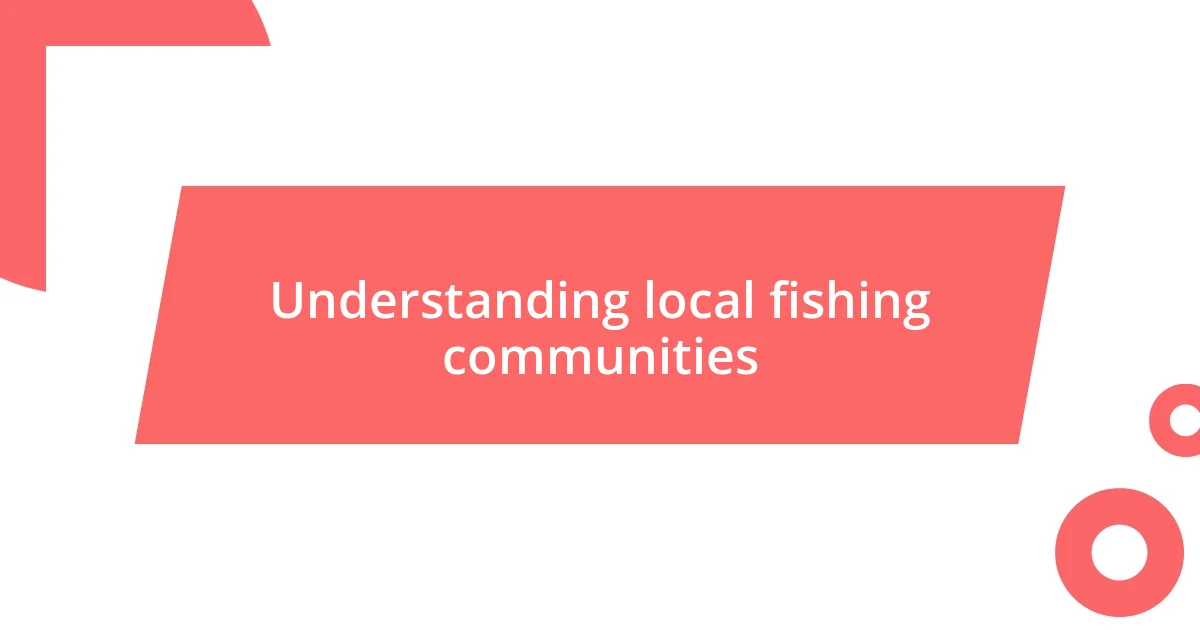
Understanding local fishing communities
Diving into the heart of local fishing communities has been a truly enlightening experience for me. I remember my first visit to a small fishing village, where the smell of saltwater was almost overwhelming, yet comforting. The fishermen were more than just tradesmen; they were custodians of traditions, passing down techniques and stories that shaped their identities. How often do we think about the heritage intertwined with our daily lives?
What struck me the most was the deep sense of camaraderie among the fishermen. I watched as they helped one another with their nets and shared tips on the best fishing spots. The bonds formed over years of shared labor and weathered storms are unbreakable. This sense of community isn’t just about fishing; it’s about sharing lives, laughter, and sometimes heartaches. Have you ever felt that kind of connection with a group of people?
Additionally, as I engaged in conversations, I learned that their relationship with the ocean is one of respect and reverence. Each catch tells a story, and every trip out into the water holds a lesson about sustainability. I often think about how we, as outsiders, can learn from their way of life. How can we honor their wisdom while also spreading awareness about the challenges they face? Listening to their insights opened my eyes to a world I hadn’t considered before, and it deepened my appreciation for the delicate balance they maintain with nature.
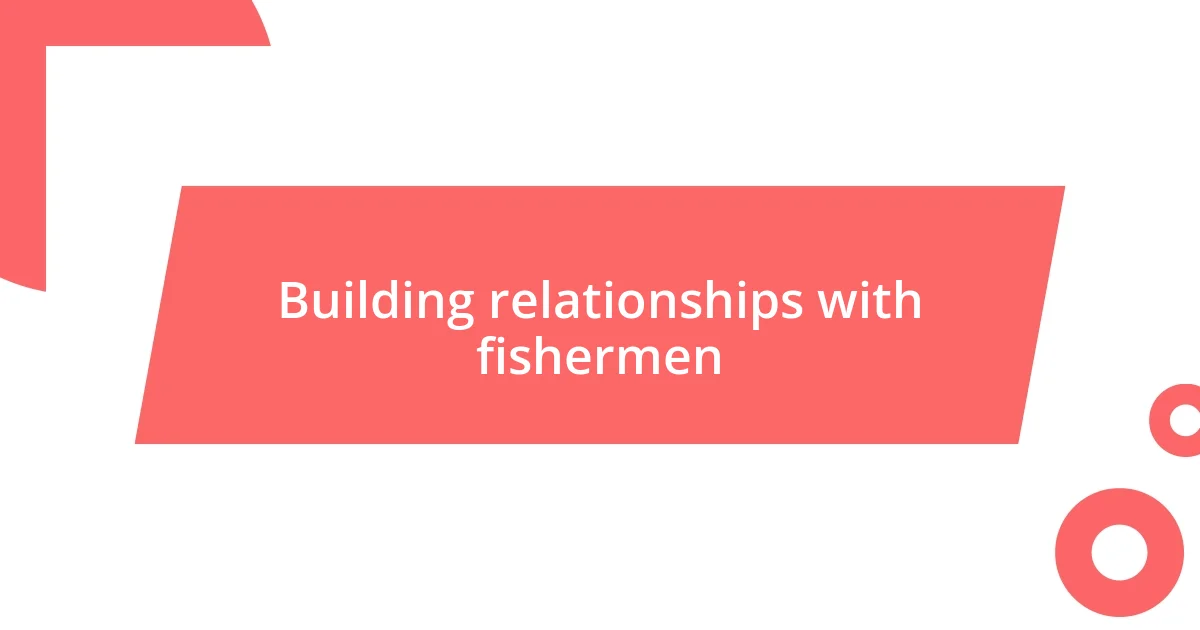
Building relationships with fishermen
As I spent more time with local fishermen, I discovered the importance of trust in these relationships. There was a day when I went out on a small boat with a seasoned fisherman named Miguel. He shared stories of his family’s fishing legacy while teaching me how to cast a net. That experience reinforced how relationships are built not just on shared interests but also through vulnerability and learning from one another. Have you ever felt that thrill when someone shares their passion with you?
In another instance, I witnessed the power of collaboration. A few fishermen organized a community event focused on sustainable fishing practices, inviting everyone to participate. The enthusiasm was contagious as they shared their knowledge with the younger generation. Seeing the joy in their faces as they passed on their skills reminded me of how vital it is to invest in relationships for the sake of future generations. Isn’t it inspiring when people come together for a common goal?
Finally, I realized that forging a bond with local fishermen requires patience and genuine interest. During my visits, I made a habit of bringing along homemade snacks to share. I noticed how these small gestures opened the door to deeper conversations, revealing their hopes and struggles. It taught me that meaningful connections often blossom in the most unexpected moments. How do you think simple acts of kindness can transform relationships in your life?
| Building Relationships with Fishermen | Key Characteristics |
|---|---|
| Trust | Essential for collaboration and learning |
| Collaboration | Strengthens community bonds and ensures sustainability |
| Patience | Fosters genuine connections over time |
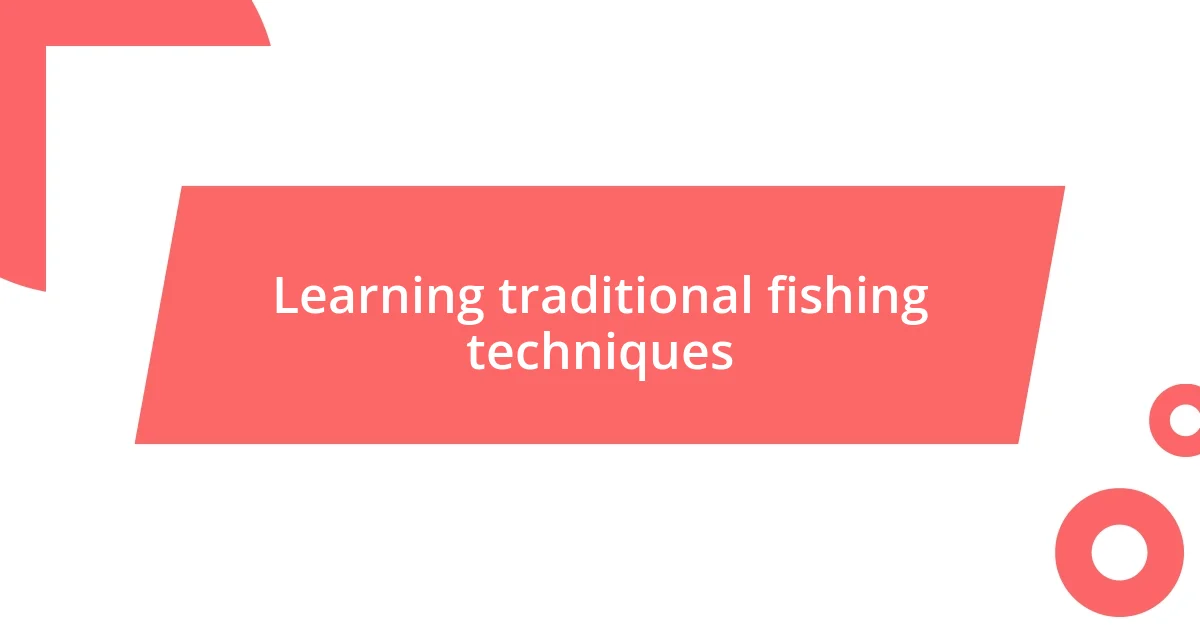
Learning traditional fishing techniques
Picking up on the discussions I had with local fishermen, I was particularly fascinated by the traditional fishing techniques they employed. One sunny afternoon, I was fortunate enough to join a group of fishermen as they prepared for a night of fishing. Watching them meticulously craft their own nets and discuss the properties of different bait felt like stepping into a live history lesson. There’s a certain intimacy in their methods that modern fishing usually overlooks. Have you ever felt that sense of connection to a craft?
From what I gathered, traditional techniques are not just practical—they embody the wisdom passed down through generations. Here are some fascinating aspects of these fishing practices that stuck with me:
- Handmade Gear: Many fishermen craft their own nets, tailoring them to the specific catches in their local waters.
- Local Baiting Techniques: They have unique strategies for using local bait, which boosts their chances of catching specific types of fish.
- Moon Phases: Some of them plan fishing trips based on lunar cycles, believing this affects fish behavior.
- Community Knowledge: Each fisherman holds valuable local knowledge, sharing stories about the best fishing spots and times to go out.
What I realized is that with each technique, there’s a story—and sometimes even a family history—that enriches the experience. It’s a beautiful dance with nature that transcends mere fishing; it’s a way of life steeped in respect and tradition. It left me thinking about how often we engage with our own communities and what wisdom we might be missing.
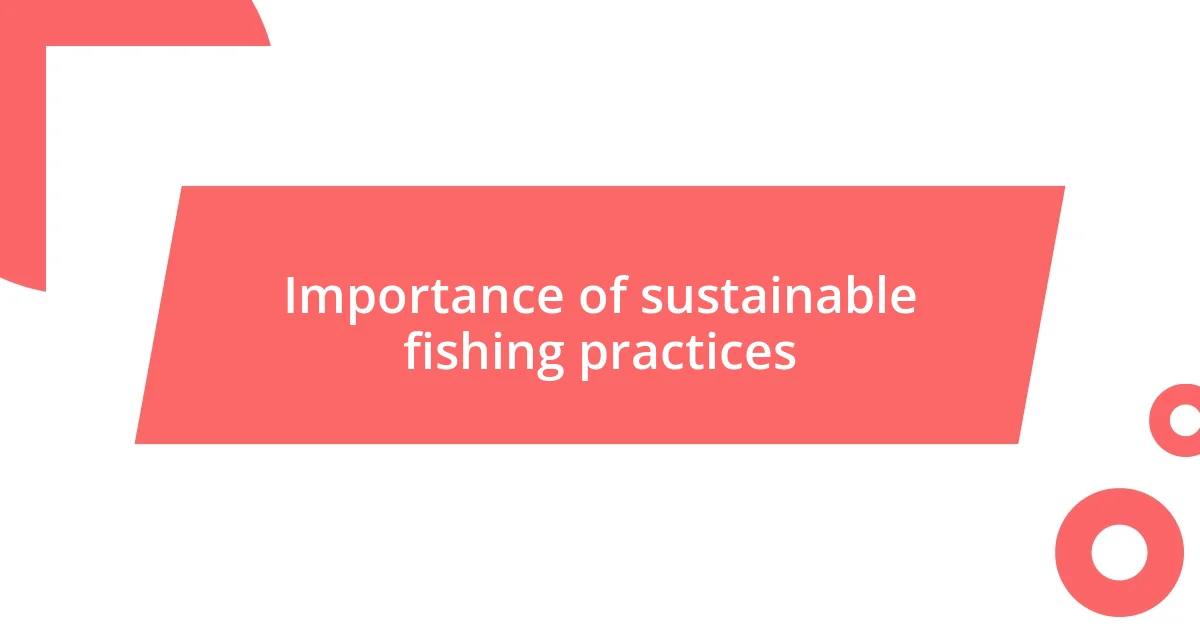
Importance of sustainable fishing practices
Sustainable fishing practices are crucial for preserving marine ecosystems and ensuring the future of fishing communities. One evening, while chatting with a group of fishermen, I felt a palpable sense of urgency when they discussed declining fish populations. They emphasized the need for responsible practices, like catch limits and seasonal closures, to prevent overfishing. It made me wonder, how often do we truly consider the long-term effects of our actions?
What really struck me was how these fishermen view their work as a stewardship of the sea rather than simply a job. During a community meeting I attended, I heard a young fisherman named Carlos passionately advocate for protecting spawning grounds. He painted a vivid picture of a future where vibrant fish populations could thrive again, and the resilience he showed ignited a hope within me. Could our collective commitment to sustainable practices spark a revival in our oceans?
Moreover, I realized that sustainability isn’t just a scientific principle; it’s a cultural belief that connects local communities. When I joined fishermen on a quiet morning expedition, they shared their frustrations about the changes they’ve witnessed over the years. They reminisced about abundant catches and crystal-clear waters, qualities they hoped to reclaim. That moment made me reflect: How can we all play a role in preserving not just our fishing practices but the stories and traditions linked to them?
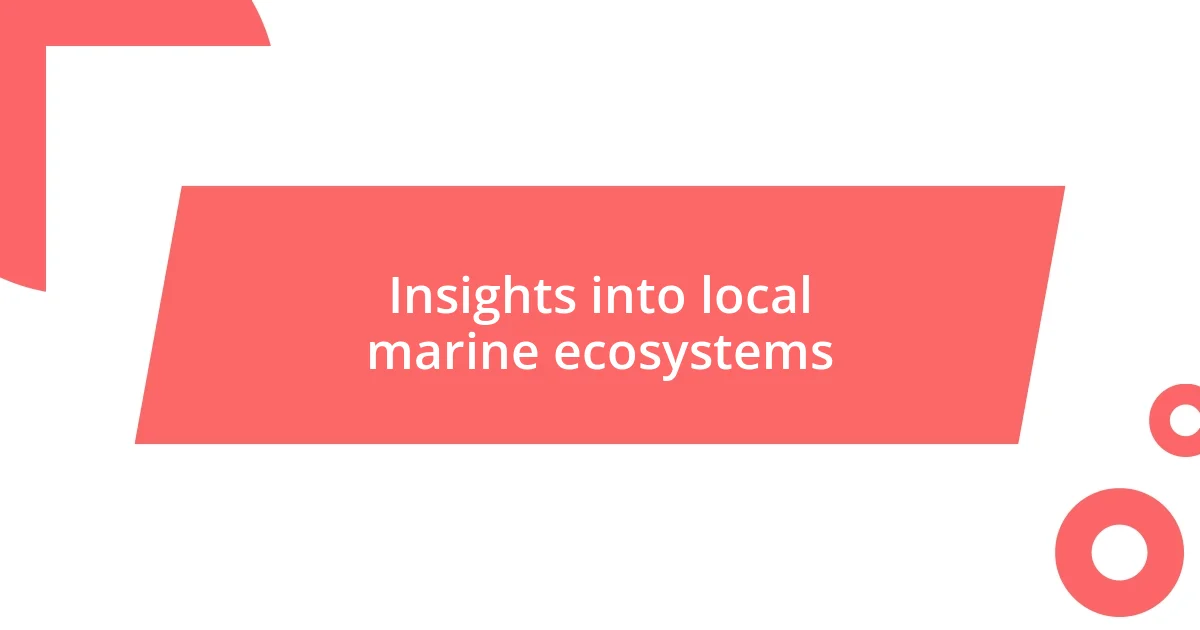
Insights into local marine ecosystems
As I ventured further into conversations with local fishermen, I began to recognize the intricate web of relationships within marine ecosystems. One fisherman, a kind man named Tom, pointed out how every catch reflects the health of these waters. He explained that the abundance of certain fish species often signals a thriving ecosystem, while declines can indicate underlying issues. This idea struck me deeply—have you ever considered how interconnected we all are, even at the most fundamental levels of nature?
Another aspect that caught my attention was the role of specific species in maintaining ecological balance. For instance, during an early morning trip, I learned from a seasoned fisherman about the importance of cleaner fish that help regulate populations of harmful species. It made me ponder how small changes in one area can ripple through the entire environment. Just imagine if we could all play a role in these natural processes; would it change the way we view our interactions with nature?
While absorbing these insights, I also sensed the emotional weight they carried. Many fishermen expressed a sense of responsibility toward preserving their local marine heritage—not just for themselves, but for future generations. I remember standing on the dock as they shared tales of dwindling catches over the years, a bittersweet ache in their voices reminding me of how fragile our ecosystems truly are. This realization compelled me to ask: What legacy are we leaving behind for the next generation, and how can we better nurture the ecosystems that sustain us?
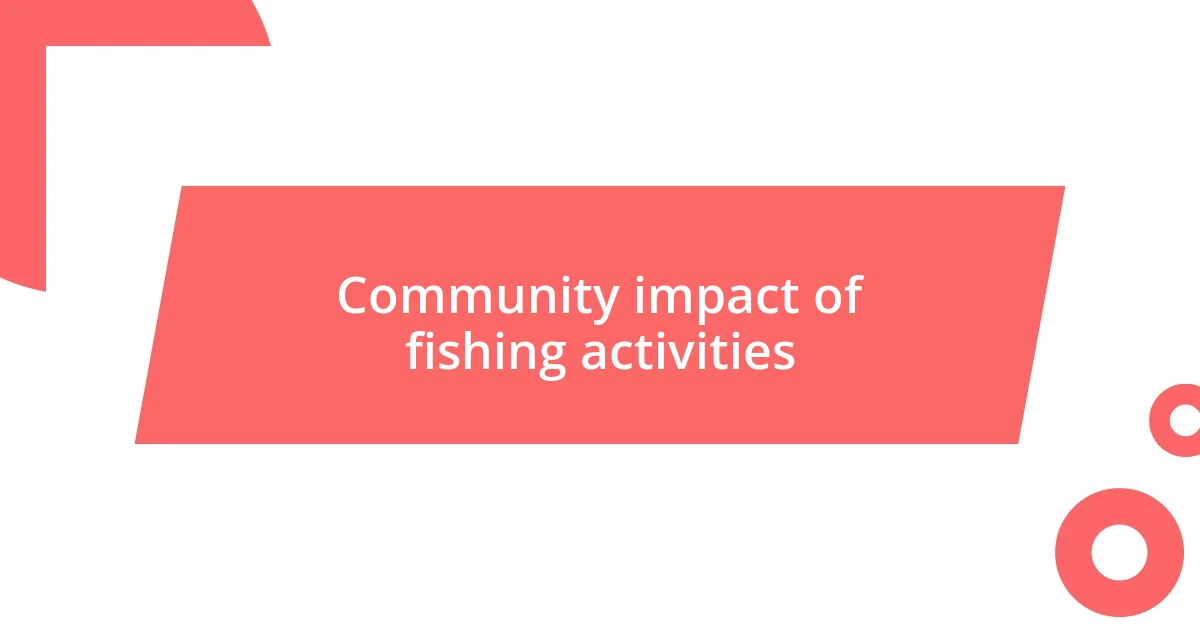
Community impact of fishing activities
Engaging with local fishermen opened my eyes to the profound impact their activities have on the community. I vividly remember one afternoon, sitting on a weathered dock surrounded by nets and crates. A wise fisherman named Javier shared how fishing is often the backbone of the local economy, providing jobs and sustenance for families. It made me think—how many communities thrive because of this age-old practice?
Yet, the social ties formed through fishing extend beyond mere economics. During a casual fish-fry gathering organized by a local fishing club, I saw how fishing brought people together. Neighbors, families, and newcomers mingled, sharing not just meals but stories and traditions that shaped their identity. This exchange of experiences made me question: could the act of fishing serve as a platform for fostering community spirit and unity?
On a deeper level, I observed how fishing also presents challenges. Many fishermen expressed concerns about regulations that sometimes seem out of touch with local realities. As I spoke with Elena, a dedicated fisherwoman, her frustration about strict quotas felt palpable. It struck me then that the health of a fishing community isn’t just about fish populations; it’s about listening to those on the water and adjusting policies to reflect their experiences. Isn’t that something we should strive for in every sector—to create systems that truly serve the people they affect?
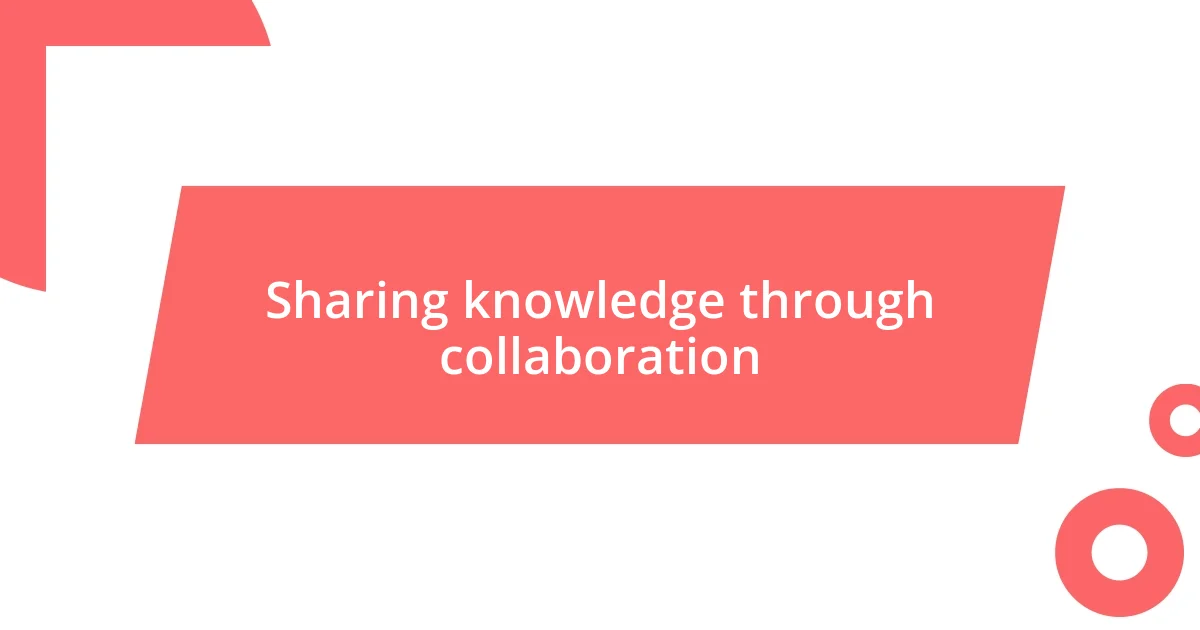
Sharing knowledge through collaboration
Collaboration among fishermen is more than just sharing fishing spots; it’s about an exchange of wisdom honed over decades. One evening, as the sun dipped below the horizon, I found myself at a local café where several fishermen gathered to discuss the day’s catch. I listened as they not only shared their techniques but also their insights on weather patterns and fish behaviors. Can you imagine the treasure trove of knowledge that flows from such informal collaboration? It’s this kind of camaraderie that can lead to a deeper understanding of sustainable practices.
As conversations deepened, I noticed how stories began to intertwine, creating a tapestry of communal knowledge. A fisherman named Marco pulled out his weather-beaten journal filled with notes—everything from migration patterns of local species to the best times to fish. He explained how each fisherman is like a piece of a puzzle, and when you put them all together, you gain a clearer picture of the ocean’s rhythms. Don’t you think that leveraging such shared experiences can genuinely enhance our approach to conservation?
I also felt a surge of inspiration as I saw the younger fishermen eagerly soaking up advice from their elders. It reminded me of my own journey of mentorship, where I cherished the guidance I received. The emotional connection formed in those moments struck a chord with me. I couldn’t help but wonder: How often do we take the time to listen and learn from those around us? When we open ourselves up to collaboration, we not only enrich our own understanding but also foster a collective commitment to preserving our maritime heritage for generations to come.

